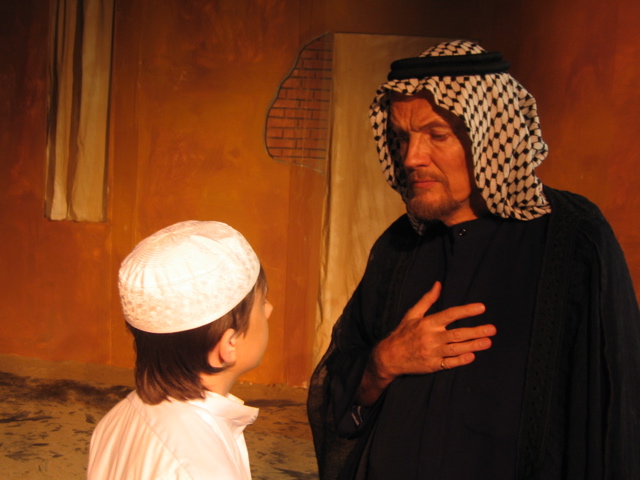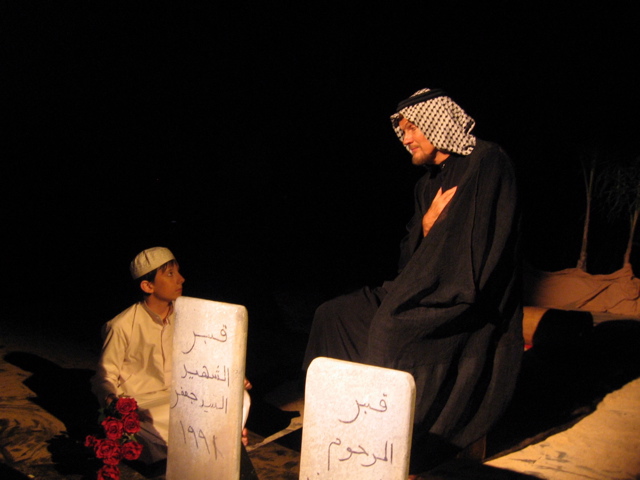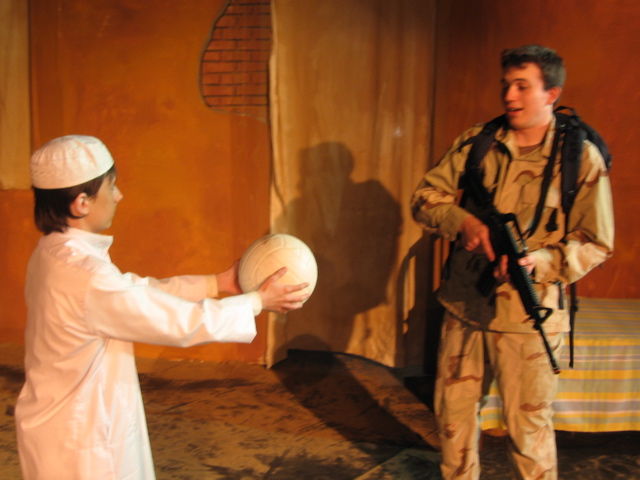Whose Story Is This?: “Born in Iraq”
Kim Surkan reviews "Born in Iraq," by Earth Speak Theater (at the Mixed Blood Theater through July 15, shows at 7:30). It's got its problems, but Surkan finds it in the end a worthwhile experience.



Political theater is best when grounded in personal experience – and that’s just what Yacoub Aljaffery brings to his script “Born in Iraq,” which he co-authored with Nestor Amarilla. Presented by Earth Speak Theater, the show opened last weekend at Mixed Blood Theatre and is based on events in Aljaffery’s life as he grew up in Iraq under the regime of Saddam Hussein.
The 90-minute play tells the story of a single family as they experience persecution for the revolutionary political beliefs of one family member, Jaffar, who is a fugitive sought by Hussein’s military forces. Arriving to arrest him during his son Ali’s wedding, they find that he is not home, and try to determine his whereabouts by arresting and torturing the son.
The plot that follows centers on his pregnant wife Fatima (Kathryn J. Hume), widow Khadija (Sonal Agarwal), and the remaining family members as they cope with the aftermath of the devastation to their life and home. Young Abbas (Travis Shanahan), born in 1991, is the character referenced by the title of the play, and he narrates many of the scenes, sometimes from offstage in voiceover.
Twelve years later, the family first celebrates the invasion of the Americans as a welcome relief from Hussein’s dictatorship, only to become more dubious about their presence after American troops continue to stay in Iraq. The grandfather, a devout Muslim played by Robert Larsen, remains a consistent calming force in the family, despite the increased unrest and bombings in their area.
In creating a picture of the life of an Iraqi family, Aljaffery and Amarilla comment on both the repressive government of Saddam Hussein and also the impact of a continued U.S. presence in the country. “In our culture, guests are welcome for three days, no questions asked,” Fatima tells an American soldier. When he asks what happens then, she explains, in a proverb found in many countries, that “fish start to stink after the third day.”
With ten main characters and an additional handful of Iraqi and American soldiers, it’s a challenge to fully develop each one, and the play seems conflicted at times as to whose story this really is. On the surface, it seems intended to be Abbas’ story, since it follows his birth and subsequent development during the occupation. But much of the play is focused on the loss of the men in the family – brother Ali and father Jaffar – and that loss seems to drive the roles of the women, who become widows mourning their husbands without any political ideas or motives of their own.
The attempt to give a voice to women’s political views comes rather abruptly in a scene between Ali’s widow Khadija and an unnamed female American soldier, when after twelve years of silence Khadija begins to speak. But her speech predictably conforms to traditional notions of womanhood. “All I’m hearing from you is the desire to be a man,” Khadija tells her. “Women do not fight.”
Astonishingly, in the ensuing exchange about women, war, and violence, the American soldier is reduced to tears and exits the stage. While the intention of creating a dialogue between the two sides is a noble one, the premise is farfetched and doesn’t add much complexity to the gender dynamics of either culture.
Despite the flatness of some of the characters, “Born in Iraq” is a unique piece of theater, notable for its frank portrayal of the impact of war on Iraqis. The cast works well together and there are moments that make this, on balance, a play worth watching.